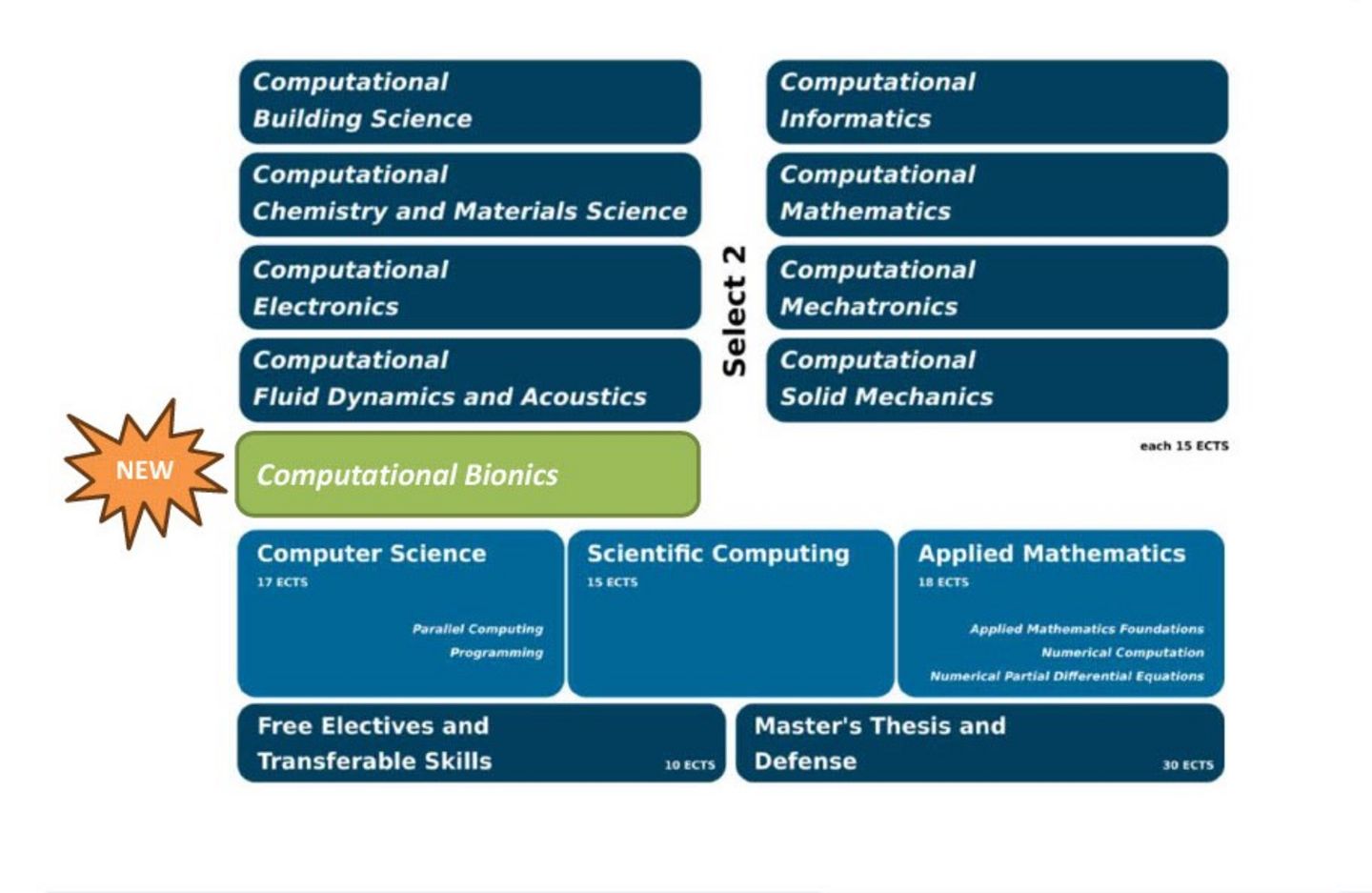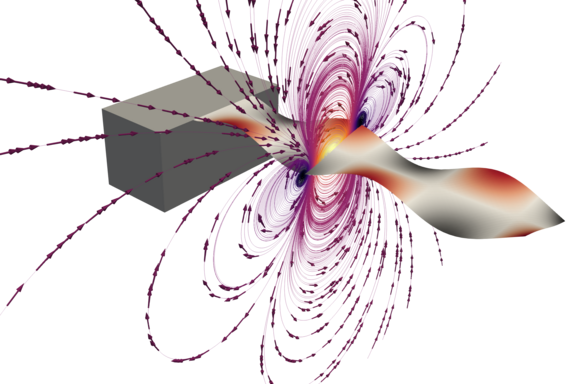Master's Programme Computational Science and Engineering
- Course ID
-
UE 066 646 - Master's Programme Computational Science and Engineering
- Duration of course
-
4 Semester
- Credits
-
120 ECTS
- Language
-
English
- Certificate received upon completion
-
Master of Science (MSc)
- Course programme
- Curriculum
-
Curriculum Computational Science and Engineering 2024, opens in new window (valid from October, 1st 2024)
Programme contents
The aim of the master’s programme Computational Science and Engineering is to introduce students to basic knowledge in the field of applied mathematics and informatics and to allow them to further specialize in at least two key areas which can be chosen from a transfaculty course portfolio (in alphabetical order): Computational Bionics (from winter semester 2024 on), Computational Building Science, Computational Chemistry and Material Science, Computational Electronics, Computational Fluid Dynamics and Acoustics, Computational Informatics, Computational Mathematics, Computational Mechatronics, Computational Solid Mechanics. These specializations enable students to complement their previous studies and furthermore allow them to focus on their personal interests and strengths.
Further information about the programme
The steady progress in science and technology is increasingly dependent on computationally intensive computer simulations. Out of the need to perform these computer simulations precisely and quickly, Computational Science and Engineering has emerged internationally as an independent and interdisciplinary research area. It combines numerical and computer science with natural sciences and engineering to provide efficient computer simulations in a variety of civil engineering, chemical, electrical, mechanical, materials, mechatronics and physics applications, from single workstations to large scale computer systems, computational clusters and supercomputers.
The English master's programme Computational Science and Engineering teaches the necessary interdisciplinary as well as scientific and excellent specialist skills.
The master's programme Computational Science and Engineering is aimed at graduates of a scientific or technical bachelor's programme. Applicants should have a strong interest in the development and implementation of computer simulations. The basis for this is an enthusiasm for the development of efficient program codes for applied mathematics as well as for the physical modeling of complex systems.
The master's programme Computational Science and Engineering is suitable for graduates of a scientific or technical bachelor's programme.
Graduates of specific TU Wien bachelor's programmes (see: details > admission requirements) are eligible for the programme without further stipulations. If a different bachelor's programme has been completed, a minium of at 30 ECTS in the fields of mathematics and computer science is required to qualify for the master's programme.
For questions regarding application for admission and enrollment please contact the Admission Office.
Persons whose native language is not English have to prove their knowledge of the English language. For a successful course of study, English is recommended according to reference level B2 (equivalent to the Austrian Matura level) of the Common European Framework of Reference for Languages. Some supplementary courses to obtain full equivalence of the completed studies are offered in German. Therefore, German language skills are recommended according to reference level B1 of the Common European Framework of Reference for Languages.
There’s no formal restriction to the order in which courses are taken, so in principle students are free to choose their own schedule. Due to the consecutive character of many courses in the degree programme it is, however, advisable to follow the semester schedule recommendations.
Aside from recommendation for when to take course for the Mandatory subjects and basic modules as well as the Key areas it also encompasses recommendations regarding starting in summer semester: It's possible to enroll in winter as well as in summer semester, but most courses are only offered in one or the other. Therefore and because of the aforementioned consecutive character of the many courses starting in winter semester will benefit the sequence of your chosen courses.
In addition to the Basic Modules and Key Areas you need to take courses amounting to 10 ECTS for the module Electives and Transferable Skills. As part of the module courses amounting to at least 4.5 ECTS have to be chosen from the centrale electives catalog Transferable Skills, opens an external URL in a new window.
Apart from that we recommend considering the following courses for your choice:
- 057.020 VSC-School I Courses in High Performance Computing (winter semester)
- 057.021 VSC-School II Courses in High Performance Computing (summer semester)
- 040.003 Scientific Work: Literature Research, Citations, and Academic Writing (winter semester, German)
- 040.004 Scientific Work: Publishing and Dissemination (winter semester)
Detailed answers to common questions about the Master's programme Computational Science and Engineering (concerning attendance, programming languages, key areas, recognition of exams, thesis, doctoral studies and job prospects) can be found on the Frequently Asked Questions page.
Examination subjects and modules


Micro-Plate
Andre Gesing is the author of the picture and it shows the flow around a micro plate. Further information from Daniel Platz.
Animation of Stent
Geometric structure of a stent geometry.
![[Translate to English:] Banner CSE](/fileadmin/_processed_/9/5/csm_Hp_Banner_2_99fc28a9f8.png)